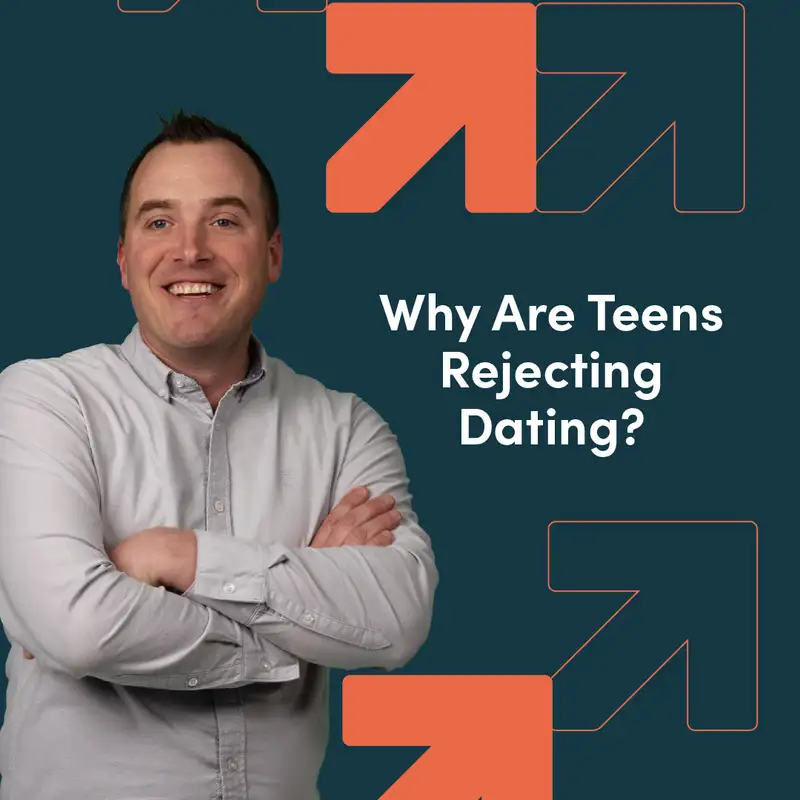Why Are Teens Rejecting Dating?
Hello, everyone. Thanks for listening to Wake Up, Look Up, a podcast where we connect events happening in real time to the gospel of Jesus Christ.
I'm Zach Weihrauch. And in today's episode, we're asking the question, why are teens rejecting dating? This is based on an article I read in The Atlantic recently about how teens are forgoing the classic rite of passage of dating.
For example, the share of teens in romantic relationships has plummeted with Gen Z. Only 56% of Gen Zers say that they have dated as teenagers, compared, for example, to 76% of the generation before them.
That is a precipitous decline. Instead of dating, young people are engaging in what they're calling situationships, emotionally charged but undefined relationships that...
don't really have boundaries or structure. Now, the reason for this is that Gen Zers are telling us they're driven by anxiety and fear of rejection.
If I date someone, I'm setting myself up to be hurt. I'm setting myself up to potentially be wounded emotionally, and I don't want that.
We've taught them to value safety over all else. And as a consequence, they're disconnecting from relationships. Now, studies will say that dating is not necessarily an indicator of healthy relationships into adulthood, but platonic friendships are.
The number of platonic friendships a teenager has is actually pretty indicative of the health of their relationships in adulthood.
But here's the problem. Gen Zers aren't doing that either. They're not just retreating from dating. They're retreating from meaningful relationships in favor of keeping everything at a surface level, of engaging with lots of people in a little bit of way, and of going online, particularly with chat GPT and other devices like that.
There's a cultural emphasis on self-sufficiency and self-protection, and it's ruining the ability of Gen Zers to engage relationally.
And I have to tell you spiritually, I think this is a massive problem. Here's why. The first reason is that we were made for intimacy with God and with people.
God says it this way in Genesis 2 verse 18, it's not good for man to be alone. What he's saying is that the task he's given Adam to be fruitful, to multiply, to fill the earth, to have dominion over it is a task that Adam can't and should not do alone.
That in the great human endeavor to be who we were meant to be, we actually need God each other. Intimacy means vulnerability. It means being fully known and fully loved.
It always runs the risk of being fully known and fully rejected. But vulnerability is actually what makes relationships meaningful. And here's my spiritual concern. A person who cannot be vulnerable with other people is, I think, a person who can't be vulnerable with God.
It's a skill, a muscle that you develop or you don't. If all you know are surface-level relationships, then at best, that's what you're going to pursue with God.
And the problem with that is that love involves risk. It involves sacrifice. Remember that Jesus said this in the Gospel of John 15, 13, greater love has no one than this, that he lay down his life for his friends.
That's sacrifice. That's Risk, by the way, keep in mind that the friends Jesus lays down his life for ultimately abandon him.
Jesus loved us enough to risk vulnerability. Jesus loved us enough to risk betrayal because that's what love does. Love does involve risk. Self-protection ultimately leads to self-isolation, a loveless kind of life.
In fact, it leads to transactional love. What Jinziers will find is that they'll use each other for sexual fulfillment or to have a fun Friday night, but they won't actually develop meaningful relationships.
Self-protective love actually misses the point. Keep in mind that in 1 John 4, 18, John writes, there is no fear in love, but perfect love casts out fear.
It doesn't do that by avoiding vulnerability. It does that by plunging headlong into it. One of the most meaningful experiences anyone can have is to be vulnerable with a person and receive love, not rejection, to receive acceptance, not betrayal.
And it's not only meaningful on a human-to-human level, it's meaningful because it sets up for the idea that maybe God can love us like that as well, which is the heartbeat of the gospel.
Listen, the church must step up here and teach us covenantal relationship, not casual relationship.
Look, the Bible tells us that God loves us on the basis of promises that he makes and he keeps, and it teaches us to model our own love for each other in much the same way.
A generation that is worried about getting hurt is a generation that is ripe to be taught the covenantal nature of marriage.
The writer of Hebrews 13.4 says, let marriage be held in honor of by all, because marriage is meant to be a relationship where one person says to another, I want to fully know you, and no matter what I find, you will not get rejection from me.
You will get love. You will get partnership. You will get commitment. Maybe we have to own the fact that Gen Z's fear about relationships is probably based on the way they've seen us love.
What a great conversation that would be with teenagers or adolescents. to ask them where their own heart is towards friendship, towards dating, towards the idea of love, and to own what we need to own to set them up for actual meaningful relationships in the future.
Remember this, a teenager who doesn't think love is possible is a teenager who ultimately will never think God can love them.
Hey, thanks for watching this episode of Wake Up, Look Up. If you enjoyed it, please help us get the word out by sharing it with someone you think might benefit from it. And while you're here, make sure to subscribe to our YouTube channel to get further content or even download the CCC app where you'll find even more resources to help you grow in your faith and relationship with Jesus Christ.
This episode of Wake Up, Look Up was produced by Marcus Cunningham and Holly Andrews. Our topic researcher is Shanna Young. This episode was directed by Rima Saleh.
Our podcast coordinator is Hallie Andrews. Our production manager and audio wizard is Marcus Cunningham, with tech and engineering support from Matthew Adel and Landon Hall.
I'm your host, Zach Weihrauch. Join us for the next episode of Wake Up, Look Up.
Creators and Guests


